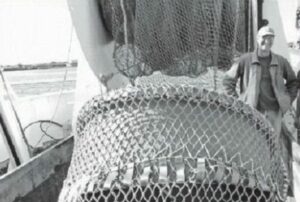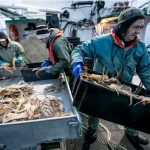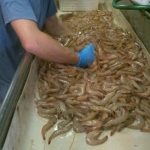Tag Archives: U.S. shrimp industry
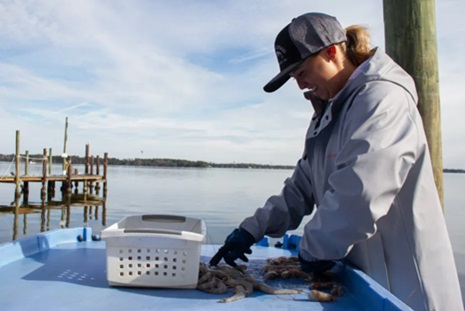
Shrimpin’ Ain’t Easy
Flicking heads off shrimp is one of the first jobs you learn when you’re born a Davis. Joseph “Jody” Davis remembers filling up a bucket of beheaded shrimp for his grandmother for a quarter when he was just 4 years old. “It wasn’t bad money in the ’70s,” he said, standing on the dock of Davis Seafood, the family business in Sneads Ferry. His 25-year-old daughter, Hannah, swiftly beheads a just-caught batch for a customer order. Muscle memory fills the bin. “We’ve been at this exact spot since 1949,” he said. “But we’ve been commercial fishermen for centuries.” The Davis Seafood office door is decorated with two stickers bearing the same mantra: “FRIENDS DON’T LET FRIENDS EAT IMPORTED SHRIMP.” Customers notice it and laugh. “But it’s more than just comedy,” Davis said. “It’s a way of life for us. And if people just cast us aside, we’re done.” photos, more, >>click to read<< 16:12
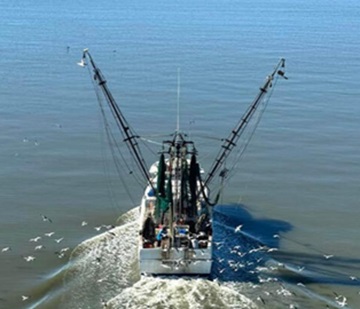
Wild-Caught Shrimp: South Carolina’s Long History
There’s something positively serene about watching shrimp boats trawling our coastal waters. Shrimping has been an important part of our culture in Beaufort and all of South Carolina since long before anyone can remember. In fact it’s been a labor of love for fishermen since before the Civil War and is still alive and kicking today with a thriving market served by dedicated commercial fishermen in the Palmetto State. Shrimp are America’s most valuable and most popular seafood, according to the NOAA Fisheries, and SCDNR tells us that South Carolina is home to three species of shrimp: brown shrimp, white shrimp, and pink shrimp. Brown and white shrimp are more common than pink shrimp, but all three taste the same. >>click to read<< 20:47
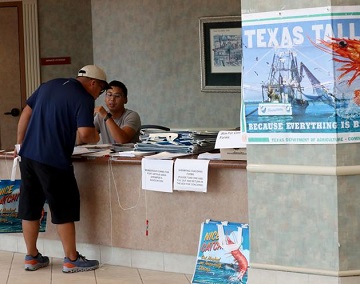
Texas shrimpers call for tariffs on cheaper Asian imports
Just days before the start of Gulf shrimp season, harvesters from all along the Texas coast are calling for government action to help them weather a storm of high fuel prices and cheaper foreign imports. More than 100 people who make a living on Gulf shrimp gathered Monday afternoon at the Doyle Convention Center to draw attention to forces they say threaten to sink their industry. Boat owners, dock owners, boat captains and deckhands huddled under a banner with six small U.S. flags to sign in and record their fears in hopes the notes would eventually reach the eyes of the U.S. Congress. Photos. >click to read< 11:41
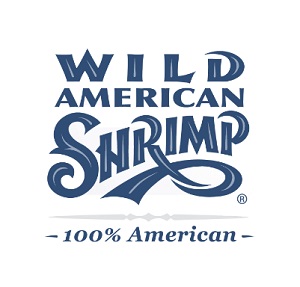
U.S. Shrimp Industry and Congressional Allies Urge ITC to Maintain Antidumping Orders on Imported Shrimp
The United States shrimp industry recently made its case to maintain antidumping orders on imported shrimp from India, Thailand, and Vietnam before the International Trade Commission (ITC). On April 11, 2023, the ITC conducted a hearing in connection with its Third Sunset Review on the antidumping orders. The American Shrimp Processors Association (ASPA) presented five witnesses from shrimp processors in Texas, Louisiana, Mississippi, and Florida who relayed stories about the continuing injury caused by ever- increasing volumes of dumped imported shrimp. >click to read< 13:58
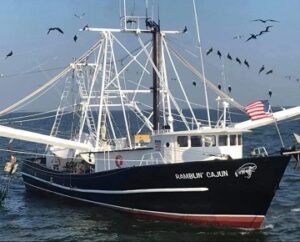
Louisiana Shrimping Industry Faces Uncertain Future in 2023
Shrimpers now face some of the lowest prices they have ever seen due to massive amounts of shrimp being imported from overseas, according to Larose-based trade group Louisiana Shrimp Association. Acy Cooper Jr, the Louisiana Shrimp Association’s president, says the math around shrimp imports are simply not in the Louisiana shrimp industry’s favor. With Louisiana able to meet roughly 25% of the overall U.S. shrimp market demand – shrimp importers from countries like Thailand, Vietnam and Indonesia have brought to market more shrimp than the United States will typically consume each year, driving the price on the open market for Louisiana shrimp lower and lower. >click to read< 13:53
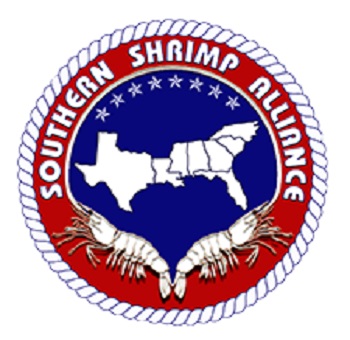
North Carolina Fisheries Association Membership, Southern Shrimp Alliance Needs Your Help!
As indicated below, the U.S. International Trade Commission has now issued questionnaires in its sunset review proceeding to the U.S. shrimp industry, U.S. shrimp importers, U.S. shrimp purchasers, and exporters and processors in the Chinese, Indian, Thai, and Vietnamese shrimp industries. The responses to these questionnaires, which are due on or before February 6, 2023, will provide the basis for the Commission’s analysis as to whether to keep the antidumping duty orders on Chinese, Indian, Thai, and Vietnamese shrimp in place for another five years. Thank you, in advance, for your assistance in meeting the U.S. International Trade Commission’s request for information. >Click to read, and access links< 13:11

Illegal foreign fishing draws congressional eye
Nathan Rickard, representing local shrimpers through the Southern Shrimp Alliance, was one of the people invited to speak on a panel to the subcommittee. He said federal anti-dumping laws helped provide stability to an industry that received a massive hit from imported shrimp beginning in the late ‘90s. “Although the industry permanently had lost many shrimping families, and has struggled to maintain its foothold in some coastal communities, the threat that the industry would entirely disappear has abated,” Rickard said. “The U.S. shrimp industry currently produced about one out of every eight pounds of shrimp that are consumed in our country. >click to read< 10:10
U.S. shrimp industry seeks relief from cheaper foreign imports

WASHINGTON — Domestic shrimp producers will find out Tuesday whether they’ll be one step closer to getting relief from the subsidized imports that have taken over about 75 percent of the U.S. market for the shellfish and, the shrimpers say, cost them billions of dollars in lost revenue. more@bdn
Hy-Vee team travels to bayou, studies source of its shrimp
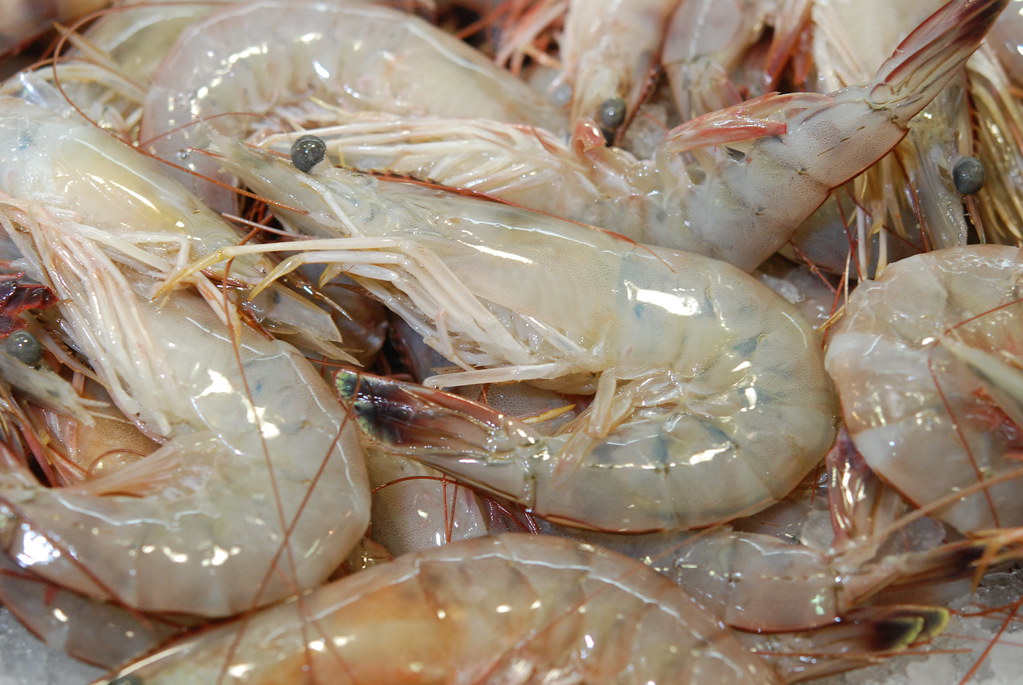 If everything you know about shrimp fishing comes from watching “Forrest Gump,” one thing is certain: You don’t know much about shrimp fishing.
If everything you know about shrimp fishing comes from watching “Forrest Gump,” one thing is certain: You don’t know much about shrimp fishing.
“The difference between us and our competitors is that we pack and sell our own shrimp,” said Alex Laperouse, who is part of the Piazza sales force. “We know our sources personally. And that means we can better control quality and consistency.”
Piazza’s president, Kristen Baumer, said the company’s approach reflects U.S. consumers’ growing desire to know the source of their food, how it is handled and what measures are taken to safeguard it. Read More






































